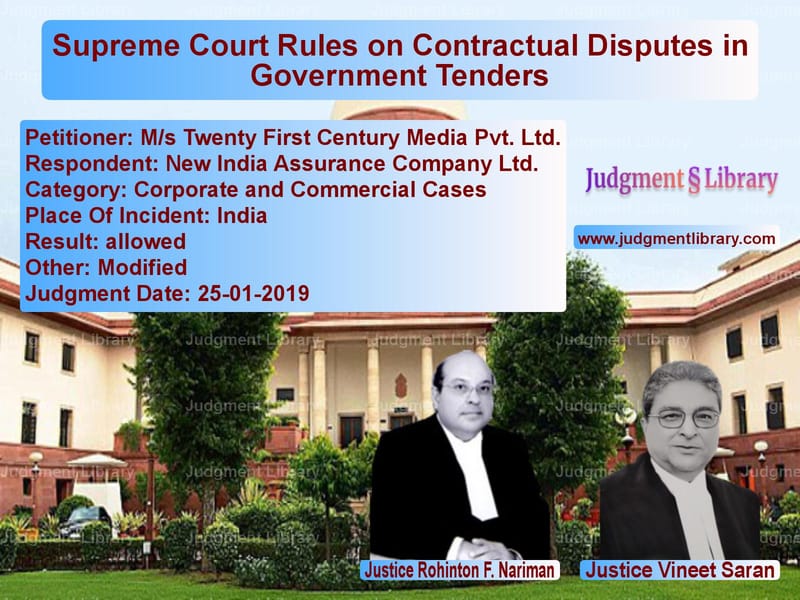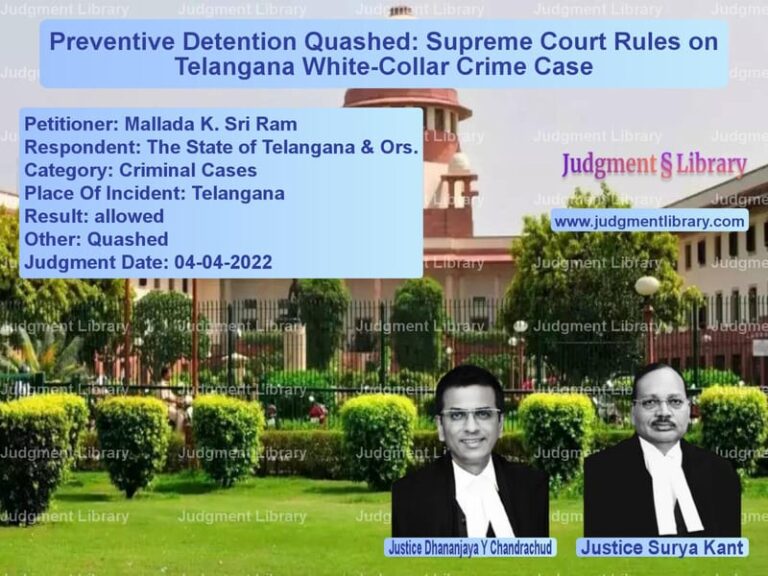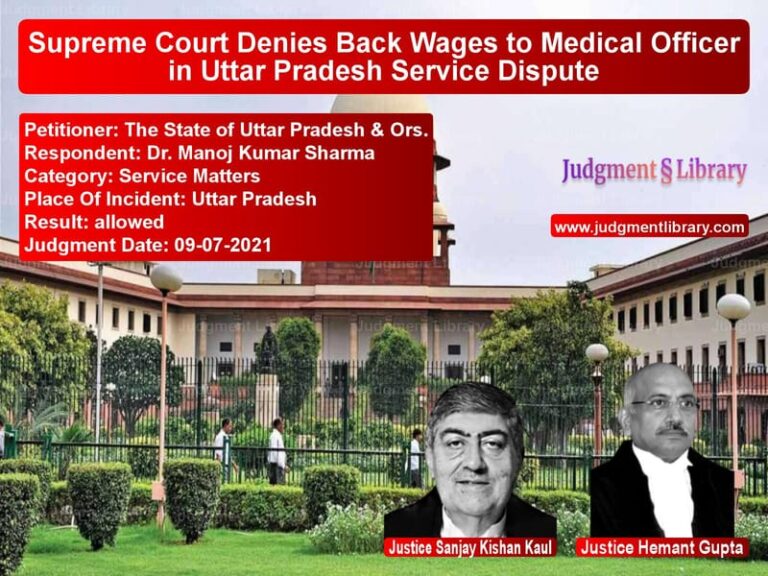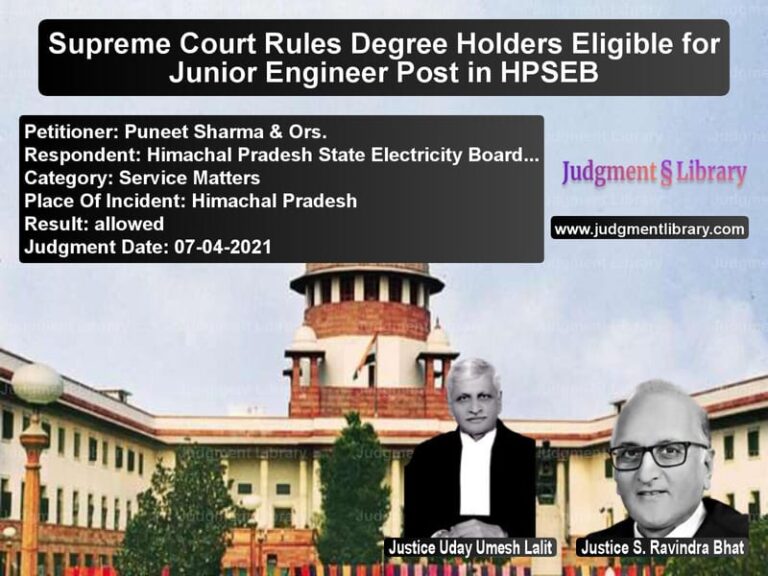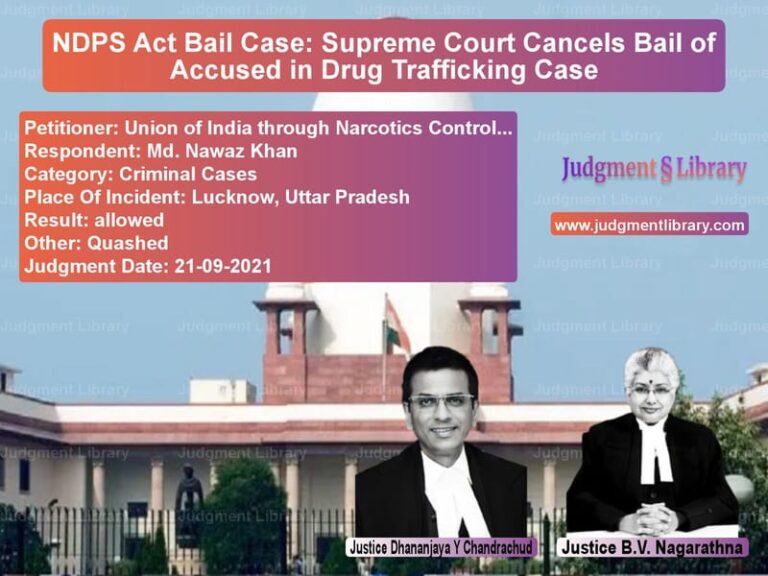Supreme Court Rules on Contractual Disputes in Government Tenders
The Supreme Court of India recently delivered a judgment in the case of M/s Twenty First Century Media Pvt. Ltd. vs. New India Assurance Company Ltd., addressing contractual disputes in government tenders. The primary issue before the Court was whether a government agency could unilaterally alter contract terms, and if such alterations violated fundamental rights under Article 14 of the Constitution of India.
The case revolved around a tender contract dispute wherein the appellant, M/s Twenty First Century Media Pvt. Ltd., challenged the unilateral amendments made by the respondent, New India Assurance Company Ltd. (NIACL), to the insurance policy contract. The judgment has broad implications for government contracts, tender disputes, and contractual fairness.
Background of the Case
The dispute arose in 2010 when the appellant, a media company, entered into an agreement with NIACL for an insurance policy covering an international event. The contract explicitly mentioned the coverage terms, including clauses related to financial loss, cancellation, and indemnification. However, shortly after the contract was signed, NIACL unilaterally altered the policy terms, reducing the indemnification limit and modifying key provisions.
The appellant objected to these modifications, arguing that:
- The unilateral changes to the contract were arbitrary and unfair.
- The modifications significantly reduced the financial protection under the policy.
- The changes were made without prior notice or consent, violating contractual obligations.
The appellant approached the High Court, seeking to quash the modified contract terms and restore the original policy conditions. However, the High Court ruled in favor of NIACL, holding that the government agency had the discretion to modify policy terms. The appellant then filed an appeal before the Supreme Court.
Key Legal Issues
- Whether a government agency has the unilateral right to alter contract terms after execution.
- Whether such unilateral amendments violate Article 14 of the Constitution by creating unequal bargaining power.
- Whether the appellant was entitled to restoration of the original contract terms.
- Whether NIACL’s modifications amounted to breach of contract under commercial law principles.
Arguments by the Appellant (M/s Twenty First Century Media Pvt. Ltd.)
- The modifications violated the principle of legitimate expectations as the appellant had relied on the original terms.
- The unilateral changes created an unfair and arbitrary disadvantage for the appellant.
- The right to fair contractual terms is protected under Article 14 of the Constitution, and government contracts must adhere to fairness and transparency.
Arguments by the Respondent (New India Assurance Company Ltd.)
- The modifications were made as part of policy standardization and applied uniformly to all similar contracts.
- The appellant had the option to terminate the contract but chose to continue under modified terms.
- The changes were necessary to protect financial liability and align with risk assessment protocols.
Supreme Court’s Observations
The Supreme Court, comprising Justice Rohinton F. Nariman and Justice Vineet Saran, ruled in favor of the appellant, emphasizing that:
- “Government contracts must adhere to fairness and transparency under Article 14.”
- “Unilateral modifications to an executed contract are impermissible unless explicitly allowed by contract terms.”
- “The right to contractual enforcement is a fundamental principle of commercial law.”
Final Verdict
The Supreme Court ruled:
- The original contract terms must be restored.
- NIACL’s modifications were invalid and unenforceable.
- The appellant was entitled to compensation for financial losses arising from contract modifications.
Legal and Industry Implications
- The ruling limits the power of government agencies to modify contracts unilaterally.
- It reinforces the importance of contractual certainty in public procurement.
- The judgment ensures that government tenders are subject to fairness and constitutional scrutiny.
The Supreme Court’s decision strengthens commercial contract law and safeguards parties from arbitrary contractual modifications, ensuring fairness in government tenders.
Petitioner Name: M/s Twenty First Century Media Pvt. Ltd..Respondent Name: New India Assurance Company Ltd..Judgment By: Justice Rohinton F. Nariman, Justice Vineet Saran.Place Of Incident: India.Judgment Date: 25-01-2019.
Don’t miss out on the full details! Download the complete judgment in PDF format below and gain valuable insights instantly!
Download Judgment: Ms Twenty First Cen vs New India Assurance Supreme Court of India Judgment Dated 25-01-2019.pdf
See all petitions in Contract Disputes
See all petitions in Corporate Compliance
See all petitions in unfair trade practices
See all petitions in Judgment by Rohinton Fali Nariman
See all petitions in Judgment by Vineet Saran
See all petitions in allowed
See all petitions in Modified
See all petitions in supreme court of India judgments January 2019
See all petitions in 2019 judgments
See all posts in Corporate and Commercial Cases Category
See all allowed petitions in Corporate and Commercial Cases Category
See all Dismissed petitions in Corporate and Commercial Cases Category
See all partially allowed petitions in Corporate and Commercial Cases Category

